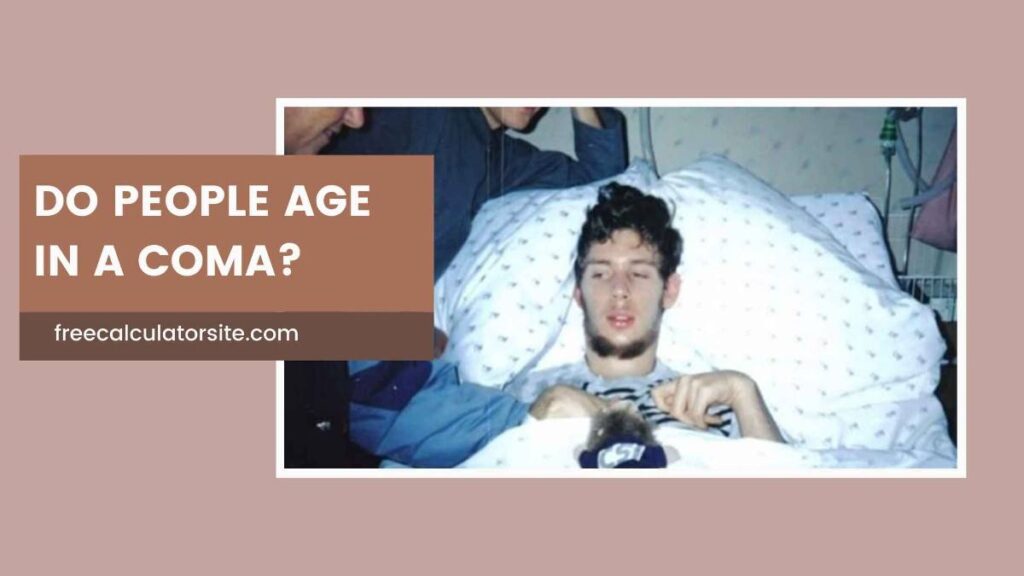Last updated on October 10th, 2024 at 07:24 pm

The concept of time and its effect on the human body is something we often take for granted.
Each day, we grow older, experience new changes in our bodies, and see signs of aging.
But what happens to someone who is in a coma—a state where consciousness is lost, and the person seems to be in a prolonged sleep?
Do they still age, both physically and mentally, while disconnected from the world?
The topic is fascinating and raises important questions about aging, consciousness, and human biology.
In this article, we will explore whether people age in a coma, how time affects them, and what scientific research has uncovered about this unique state of existence.
What is a Coma?
Before diving into the topic of aging, it’s important to understand what a coma actually is.
A coma is a prolonged state of unconsciousness in which a person is unresponsive to external stimuli.
Unlike sleep, where a person can wake up, people in a coma cannot be easily awakened, and they show minimal brain activity.
Comas can be caused by various factors, including traumatic brain injuries, strokes, infections, or severe illnesses like diabetes or liver failure.
Comas can last for varying durations—hours, days, months, or even years.
In some cases, individuals emerge from comas fully conscious, while others may transition into a persistent vegetative state or even remain in a coma indefinitely.
See Also: Do Feet Get Bigger with Age?
Physical Aging in a Coma
The short answer is yes, people do physically age in a coma.
The body continues to follow its natural biological processes regardless of consciousness.
The heart continues to beat, the lungs continue to breathe (often with the help of medical equipment), and the cells in the body continue to undergo processes like metabolism, repair, and regeneration.
From a purely biological standpoint, the body remains alive and ages just as it would if the person were awake.
However, the rate and appearance of aging might not be the same for someone in a coma as it would be for a healthy, conscious individual.
Several factors come into play:
- Muscle Atrophy: Since individuals in a coma are immobile for extended periods, their muscles tend to atrophy or weaken. The lack of physical movement leads to the loss of muscle mass and strength, causing the person to physically appear older or frailer when they eventually regain consciousness.
- Skin Changes: Prolonged immobility also affects the skin. People in comas are at higher risk of developing bedsores, skin infections, and other dermatological issues due to constant pressure on certain parts of their bodies.
- Hormonal Changes: Comatose individuals may experience disruptions in their hormonal cycles. For example, stress hormones like cortisol may fluctuate, which can impact aging processes such as the graying of hair or the formation of wrinkles.
Despite these changes, the body’s biological clock continues to tick, and age-related processes like cellular aging, telomere shortening, and DNA damage still occur.
Mental and Cognitive Aging
While the body physically ages in a coma, mental or cognitive aging is more complex.
The brain is the central hub for cognitive functions like memory, decision-making, and emotional regulation.
In a coma, brain activity is significantly reduced, and the person is not experiencing the world in the same way they would if they were conscious.
This raises the question: Does the mind age in a coma?
There’s no clear-cut answer to this. Research on cognitive aging during coma states is still limited.
However, it’s reasonable to infer that the mind ages differently than the body.
The brain might undergo physical changes, such as atrophy in certain regions due to lack of use, but cognitive functions that require consciousness—like learning, memory formation, and emotional processing—are on hold.
For instance, if someone entered a coma at 30 and woke up 10 years later, they would biologically be 40 years old, but mentally, they might still feel like they are 30.
They wouldn’t have had the life experiences, memories, or emotional growth that typically occur over a decade of living.
This disconnect between physical and mental aging could pose significant challenges during recovery, as the individual may need to relearn basic skills or adjust to changes in their body and environment.
Also Read: Do Ears Grow With Age?
Psychological and Emotional Impact Upon Waking
One of the most striking aspects of coma recovery is the psychological adjustment.
When someone wakes from a long coma, they are often disoriented and confused.
Time, for them, has passed in an instant. Imagine falling asleep today and waking up 10 years from now.
The world has moved on, technology has advanced, people in your life may have changed or passed away, and your own body feels unfamiliar.
The psychological impact of waking up from a coma can be profound.
Many individuals experience anxiety, depression, or trauma, as they try to reconcile the lost time and their new reality.
They may feel trapped in a body that has aged or changed while their mind still feels young.
Rehabilitation is often necessary to help the individual regain physical abilities and cognitive functions, but the emotional toll of realizing how much time has passed can be immense.
Does the Aging Process Slow Down in a Coma?
One of the more speculative aspects of aging in a coma is whether the aging process itself slows down due to reduced metabolic and brain activity.
While the body still ages biologically, some researchers have speculated that the overall wear and tear on the body might be less severe in a comatose state due to reduced physical and mental strain.
However, this is a contentious topic.
On the one hand, the body is under stress from being immobile, hooked to machines, and potentially battling infections or illnesses.
On the other hand, it’s not experiencing the everyday stressors that contribute to accelerated aging, such as environmental toxins, poor diet, or emotional stress.
More research is needed to understand how exactly coma affects long-term aging.
Conclusion
In the end, people do age in a coma, but the way they experience that aging is far from straightforward.
Physically, the body continues its biological processes, but mentally and emotionally, time may feel like it stands still.
The challenges of waking up after a long coma involve not only physical recovery but also psychological adjustment to lost time.
While science has made significant strides in understanding coma states and their impact on the body, much remains unknown about the deeper mysteries of consciousness and time.
The idea of aging while in a prolonged unconscious state reminds us that time is a complex and multifaceted phenomenon, affecting us in ways that go beyond mere physical change.

Akash Singh is a finance enthusiast who shares valuable insights on various calculators.
